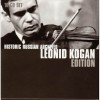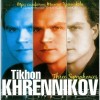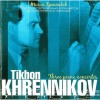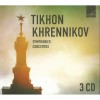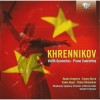Biography
Tikhon Nikolayevich Khrennikov (June 10 [O.S. May 28] 1913 – 14 August 2007) was a Russian and Soviet composer, pianist, leader of the Union of Soviet Composers, who was also known for his political activities. He wrote three symphonies, four piano concertos, two violin concertos, two cello concertos, operas, operettas, ballets, chamber music, incidental music and film music.
Tikhon Khrennikov was the youngest of ten children, born into a family of horse traders in the town of Yelets, Oryol Governorate, Russian Empire (now in Lipetsk Oblast in central Russia).
He learned guitar and mandolin from members of his family and sang in a local choir in Yelets. There he also played in a local orchestra and learned the piano. As a teenager he moved to Moscow. From 1929 to 1932, he studied composition at the Gnessin State Musical College under Mikhail Gnessin and Yefraim Gelman. From 1932 to 1936, he attended the Moscow Conservatory. There he studied composition under Vissarion Shebalin and piano under Heinrich Neuhaus. As a student, he wrote and played his Piano Concerto No. 1, and his graduation piece was the Symphony No. 1. His first symphony was conducted by Leopold Stokowski. He became popular with the series of songs and serenades that he composed for the 1936 production of Much Ado About Nothing at the Vakhtangov Theatre in Moscow.
Together with other official representatives of Soviet culture (N.Chelyapov, N. Myaskovsky, N. Chemberdzhi, S. Vasilenko, V. Bely, A. Veprik, A. Khachaturian, B. Shekhter, M.Starodokamsky, G. Khubov, V. Muradeli, V. Yurovsky and L. Kulakovsky), Khrennikov signed the statement welcoming "a sentence of the Supreme Court of the Soviet Union, passed on traitors against the motherland, fascist hirelings, such as Tukhachevsky, Yakir and others".
Having "adopted the optimistic, dramatic and unabashedly lyrical style favored by Soviet leaders", Khrennikov shot to fame in 1941, with the "Song of Moscow" ("Свинарка и пастух", meaning "Swineherd and Shepherd") from his music score for the popular Soviet film They Met in Moscow, for which he was awarded the Stalin Prize. In 1941, Khrennikov was appointed Music Director of the Central Theatre of the Red Army, a position he would keep for 25 years.
In February 1945 Khrennikov was officially posted by the Political Authority (Politupravlenie) of the Red Army from Sverdlovsk, where he and his family had been evacuated, to the First Belorussian Front, and the Army commanded by General (later Marshal) Chuikov.
In 1947 he joined the Communist party and became a deputy of the Supreme Soviet.
In 1948, Andrei Zhdanov appointed Khrennikov Secretary of the Union of Soviet Composers, a job he would keep until the collapse of the Soviet Union in 1991 and for which he is most remembered.
For a long time it was held that, thanks to Khrennikov's efforts, no Soviet composers were arrested or prosecuted.
In an interview with pianist Jasha Nemtsov on 8 November 2004 in Moscow, Khrennikov asserted that composer Mieczysław Weinberg, when arrested, had been discharged immediately because of Khrennikov's protection; according to Khrennikov the same had happened to Alexander Veprik. The facts are that Veprik spent four years in a prison camp and Mieczysław Weinberg, who was released in June 1953, had been saved from prosecution, and probably from execution, only because of Stalin's death. In recent years, information that had been suppressed since 1948 began to be published, and documents and facts now known confirm that there were extensive prosecutions.
In 1949 Khrennikov officially attacked the young composer Alexander Lokshin, using formulations of one of Stalin’s most notorious ideologists, Paul Apostolov. In his speech Khrennikov contrasted Lokshin‘s "modernist" style with the bylina Stepan Razin's Dream by Galina Ustvolskaya, which he considered an ideal example of true national art.
Khrennikov's speech aroused great indignation in Mikhail Gnessin, who accused him of duplicity: not daring to criticise Lokshin in a professional environment, Khrennikov attacked him ideologically from his position as a leading Soviet official. After this ideological campaign Lokshin was excluded from academic circles.
Khrennikov did not prevent Prokofiev’s first wife, Lina Ivanovna, being charged as a "spy" following her arrest by the NKVD on 20 February 1948. As head of the Composers' Union, Khrennikov made no attempt to have the sentence against Lina Prokofieva quashed, or even to mitigate her fate in the Gulag. The Composers' Union did not help Prokofiev's sons, who were compulsorily evicted from their apartment. After Lina Ivanovna Prokofieva returned from Gulag, the Composers' Union did nothing to improve the extremely bad living conditions of her family; it was the prominent singers Irina Arkhipova and Zurab Sotkilava who protected Prokofiev’s first family. Afterwards, the family was exposed to regular official humiliations. According to Prokofiev's first son, Sviatoslav, the Composers' Union officially refused Lina Prokofieva permission to go to Paris, after she had been personally invited by the French culture minister to the opening of Prokofiev's memorial board. Instead, Khrennikov took part at that ceremony with his whole family. The Composers' Union also refused Lina Prokofieva permission to go to the opening of the Sydney Opera House. At the same time, Sviatoslav Prokofiev noted the typical logic of the Soviet functionary: sometimes Khrennikov could help if it was not dangerous for his own position and career.
The ideological campaigns of 1948-49 against "formalists" in music were directly connected with the offensive against the so-called rootless cosmopolitans, which formed a part of the state anti-Semitism in the Soviet Union that flourished after the Second World War in various forms: ideological resolutions, declarations by official writers and critics, offensive caricatures and vulgar anti-Semitic abuse in the satirical magazine Krokodil (Crocodile). Historians of state anti-Semitism in the USSR name Khrennikov among the most active fighters for "purity of Russian culture". In Soviet official policy both before and after Stalin's death, a clear distinction was drawn between "good Soviet Jews" and "Nazis-Zionists". True to this party line, the leadership of the Soviet Composers‘ Union branded composers as "zionist aggressors" or "agents of world imperialism", and made accusations of "ideologically vicious" and "hostile" phenomena in Soviet musical culture. An accusation of zionism was often used as a weapon against people of different nationalities, faiths and opinions, such as Nikolai Roslavets. "Struggle against formalists" was pursued in other countries too: according to György Ligeti, after Khrennikov’s official visit to Budapest in 1948, The Miraculous Mandarin by Béla Bartók was removed from the repertoire and paintings by French impressionists and others were removed from display in museums. In 1952 Ligeti was almost forbidden to teach after he had shown the score of the proscribed Symphony of Psalms by Igor Stravinsky to his students; Ligeti was saved only because of the personal protection of Zoltán Kodály.
Khrennikov and other functionaries of the Composers‘ Union constantly attacked the heritage of the Russian avant-garde as well as its researchers. For example, the German musicologist Detlef Gojowy (1934–2008) was persecuted because of his promotion in the West of modern Soviet music of the 1920s. Gojowy was proclaimed to be an "anti-Soviet writer" – till 1989 he was forbidden to visit the Soviet Union and some of his publications that he sent to Soviet colleagues were intercepted by Soviet customs. At the same time, Soviet musicologists engaged in developing a Russian avant-garde tradition were officially prohibited from going abroad. Once again, Nicolai Roslavets was an example.
Khrennikov was a Member of Central Committee of the Communist Party of the Soviet Union from the 1950s on. From 1962, he was a representative in the Supreme Soviet of the USSR.
Khrennikov was an active concert performer through his entire life, playing his piano concertos as well as his songs and other compositions. He collaborated with the violinist Leonid Kogan and the cellist Mstislav Rostropovich who gave premieres of his cello concerto and two violin concertos. Among his popular film scores were Six O'Clock in the Evening After the War (1944), True Friends (1954) and Hussar Ballad (1962) directed by Eldar Ryazanov. He also wrote critically acclaimed music for the ballet Napoleon Bonaparte. In the 1980s Khrennikov resumed composition with renewed vigor. In his Symphony No. 3, Khrennikov used elements of serialism, which he had denounced in earlier years.
Some of Khrennikov's statements mentioned above are included in the 2004 documentary Notes interdites: scènes de la vie musicale en Russie Soviétique (English title: The Red Baton) by Bruno Monsaingeon, which also has extensive footage of conductor Gennadi Rozhdestvensky, one of Khrennikov's most acerbic critics.
Khrennikov was interviewed by former BBC correspondent Martin Sixsmith for the BBC's 2006 radio show Challenging the Silence. In it Khrennikov reacts angrily to the suggestion he was at the heart of the criticism of composers such as Prokofiev and Shostakovich, though he expressed pride that he "was Stalin's Commissar. When I said No! (he shouts), it meant No."





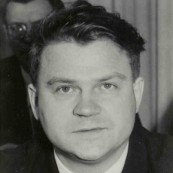

![Russian legends - Leonid Kogan [10 CD]](http://static.classicalm.com/repository/collection-cover/small/269-img1318707830156876.jpg)
